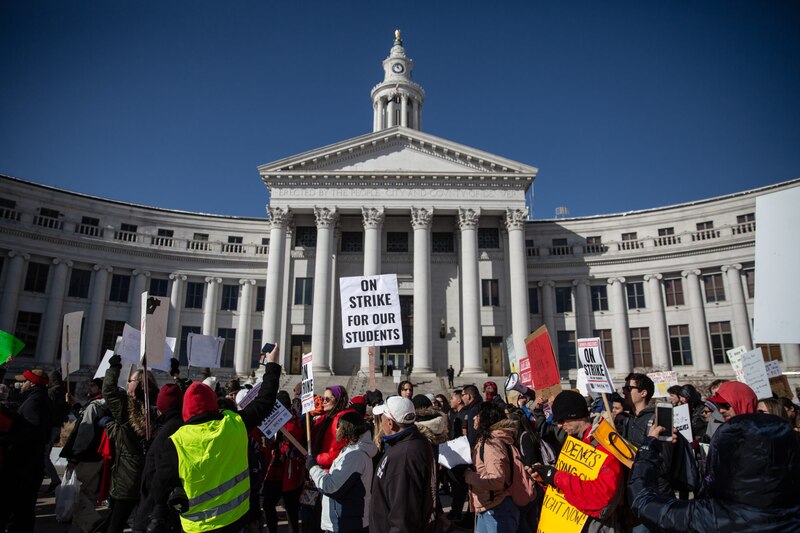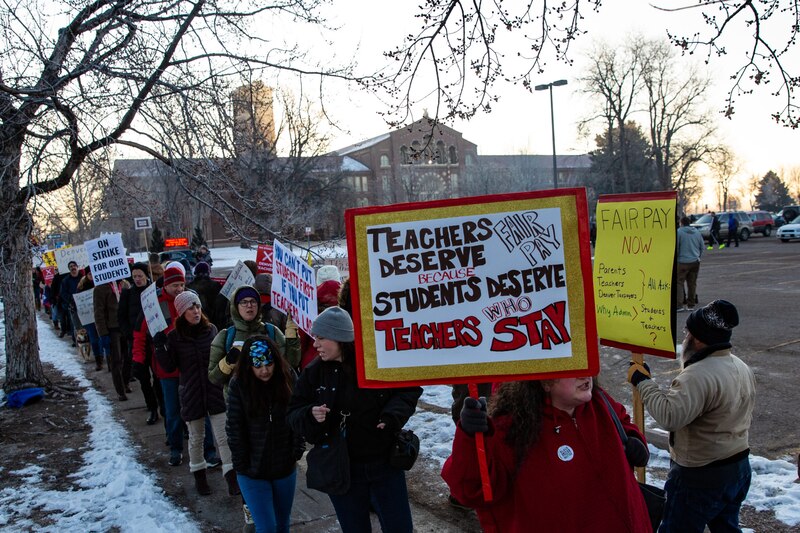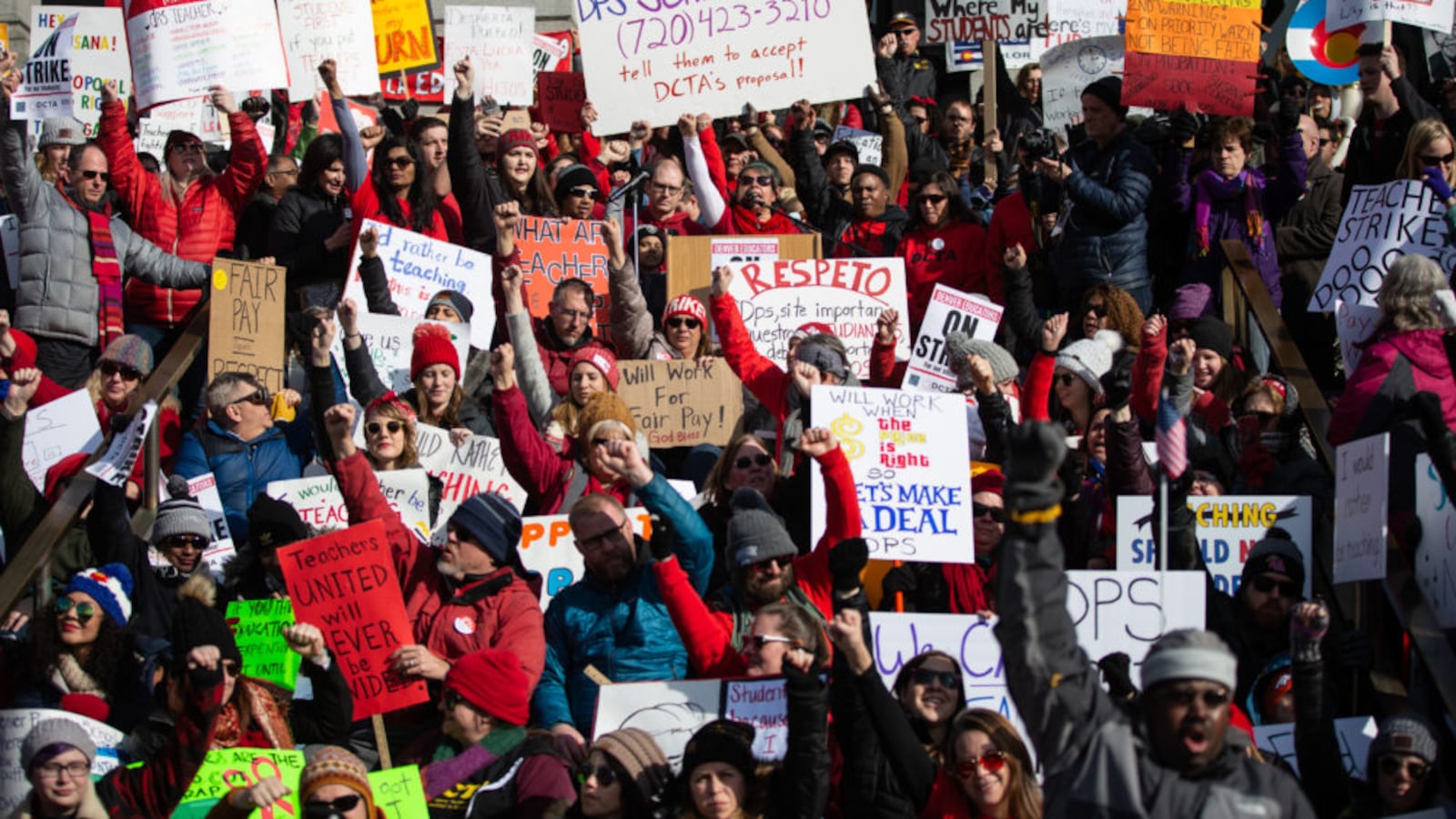Denver teachers took to picket lines for the first time in 25 years Monday, braving frigid temperatures to demand across-the-board raises and a more predictable pay system that is less dependent on complicated bonuses.
“It’s about pay, but it’s also about respect,” said Ryan Marini, a social studies teacher and football coach at South High School. “We lose great teachers every year.”
The Denver teachers union is fighting for a major revision to ProComp, the district’s complex teacher pay system, once hailed as a model. The dispute reflects deep philosophical differences in how teachers should be paid, as well as pent-up frustration with a host of education reform policies, and has attracted nationwide attention, including a visit from the president of the National Education Association.
Still, opinions among Denver educators were mixed, with some teachers staying in their classrooms.
Denver Public Schools and the Denver Classroom Teachers Association are set to return to the bargaining table at 10 a.m. Tuesday in search of a resolution that could bring the strike to an end. The two sides gave differing accounts of the size of Monday’s strike. The district reported 2,631 out of 4,725 teachers — or about 56 percent — didn’t show up to work.
But the district count didn’t include nurses, counselors, and other educators who also belong to the union. The Denver Classroom Teachers Association counted 3,769 out of 5,353 Denver educators on the picket lines Monday, which would put strike participation at 70 percent.
“We got a word for that in hip-hop,” said teacher Gerardo Muñoz, who was one of two emcees for an afternoon rally on the steps of the Capitol. “We call that steady mobbin’.”
Participation in the strike is an important indicator of how many teachers support the union’s position. The district believes its offer, which increases base pay while still maintaining more robust bonuses and incentives, is a good one, and it has been trying to make that case directly to teachers and the general public. Significant participation in the strike increases the union’s leverage at the bargaining table both by making it harder to keep schools open and by showing that the union speaks for most — if not all — teachers.
Meanwhile, inside schools, the experience varied widely — from student walkouts in support of teachers at several high schools to classrooms the superintendent described as “very calm and quiet.” The district said it deployed approximately 1,400 central office staff and 400 substitute teachers to cover for those who walked out, sometimes grouping students by grade to deliver lessons.
“It was a hot mess,” said East High School sophomore Quinn Biannucci, who walked out of school after waiting in line for 20 minutes to get her schedule — and only moving five feet.
Across town at Abraham Lincoln High School, 15-year-old Adrina Trejo reported being in a packed classroom with 34 other students and handed a packet of work that “didn’t even relate to what we’ve been working on,” she said. “We would rather be learning with our teachers.”
The last attempt to reach a deal on ProComp came to a dramatic end Saturday when the union rejected the district’s latest offer, which would have invested more money in teacher pay but also upped the size of an incentive for teachers in “highest-priority” schools.

This incentive has been one of the biggest sticking points in negotiations. The district sees it as key to attracting teachers to schools with high rates of poverty, students with special needs, and English language learners. The union wants to scrap the incentive and use the money to increase the salaries of all teachers, arguing that stable pay is what makes teachers stay.
On the picket line, teachers said ProComp has failed them. Aaron Lowenkron said the only reason he can live in Denver, at 40 years old, is because he gets financial help from his parents
“I used to feel shame about that,” said Lowenkron, a math teacher at East High School. “But how many teachers in Denver say the same thing?”
Shannon McElhany, a teacher at Schmitt Elementary School, said she is considering leaving Denver. Even with two other jobs, teaching yoga and working for a catering company, she hasn’t been able to afford to buy a house in the city, where the median home price is nearing a half million dollars. The average Denver teacher salary, inclusive of bonuses and stipends, is $62,095 this year, according to the district. The average base salary is $57,723.
“I hold two degrees, and I’ve been rated ‘distinguished’ for the past three years,” McElhany said, referring to the district’s teacher rating system. “I think I deserve more.”

Denver Public Schools officials noted that fewer teachers were absent Monday at the 30 “highest-priority” schools that get the bonus the union wants to eliminate. According to the district, 507 of 1,139 teachers in those 30 schools did not report to work. That’s 44 percent of teachers who weren’t at their jobs, which is lower than the districtwide percentage.
Tory Tripp is a math teacher at Manual High School, one of the 30 “highest-priority” schools. She did not strike Monday. Part of the reason, she said, is that she agrees with the district philosophy that teachers who work in high-poverty schools deserve more pay.
“Striking is such a sacrifice for your personal finances, for taking away instruction from kids, and I didn’t think that the union’s proposal was worth it to strike,” Tripp said.
Teachers who went out on strike were not paid.
The district did not have a count Monday of how many students attended school. But officials provided some numbers that suggest attendance was lower than normal. For instance, the district served 20,386 breakfasts Monday morning, down from the usual 31,600.
All schools were open Monday, with the exception of preschool classes. The district canceled those last week in anticipation of not having enough qualified staff to cover them.
The strike has some parents worried about what will happen in the classroom without regular teachers in place. When Maria Claustro dropped off her granddaughter early Monday at Schmitt Elementary in southwest Denver, she made a point of walking into the office — even though district employees stood outside school greeting students.
“I asked them to call me if anything changes or if they’re not having classes,” Claustro said. She’s not happy about the strike, but said, “it’s their right to ask for a fair wage. I think they are asking what’s fair.”
Jennifer Nguyen, a mother of four, also expressed concern. At Schmitt, she said, “the original teachers know how the kids are learning, know if students are misbehaving or need extra help on math. The new people today don’t necessarily know all of that.”
Asked how long the strike could go on before it became a problem, Superintendent Susana Cordova said it already was.
“It’s a problem now,” she said. “It’s a problem today.”

Cordova did not say whether the district would offer a new ProComp proposal Tuesday, noting that she’d already committed to cutting $20 million over the next two years from the district’s central office to fund pay increases for teachers, as well as for custodians, bus drivers, and other employees.
“The goal of negotiations is for us to get close to the middle,” Cordova said. “DPS is way past the middle in terms of what we’ve offered thus far.”
But at a rally Monday afternoon, the union made it clear the district hasn’t gone far enough to give teachers what speakers called a clear, transparent, and professional pay scale.
“For 15 long months, we have shouted this injustice from the rooftops,” said Rachel Sandoval, a fifth-grade teacher at Godsman Elementary School and a union board member, referring to the amount of time the two sides have been negotiating. “Can you hear us now?”

